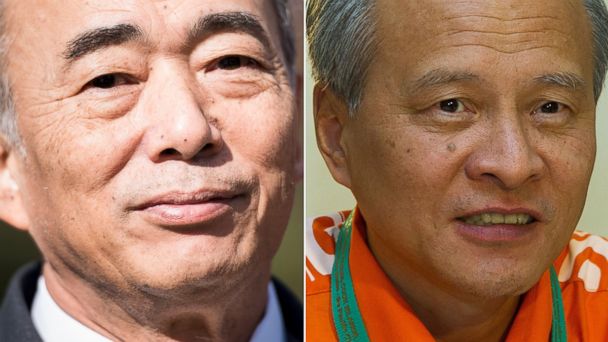Japan and China at War on the Op-Ed Page

From left, Japanese ambassador to the United States Kenichiro Sasae and Chinese ambassador to the United States Cui Tiankai. Brendan Smialowski/Getty Images | Marty Melville/AFP/Getty Images
It's the latest in a series of antagonistic moves by both countries, including China's inclusion of hotly-contested islands in a map of its air defense zone, and Japanese Prime Minister Shinzo Abe's December visit to a shrine of World War II dead that includes Class A war criminals, an affront to both China and South Korea.
The opening salvo in the latest scuffle came from China's ambassador to the United States Cui Tiankai, who wrote on Jan. 9 that Abe's visit to the Yasukuni shrine "deeply disturbed people in China and much of Asia. The dispute surrounding his actions is about more than symbolism; it goes to the heart of his intentions for Japan's future and his willingness to build an atmosphere of trust, respect and equality in East Asia."
Japan's Deputy Foreign Minister Nobuo Kishi paid a visit to Undersecretary of State Bill Burns this week to explain the shrine visit. State Department spokeswoman Jen Psaki did not shed much light on the conversation and said Thursday only that they "discussed a full range of issues."
Cui's editorial went on to condemn Japan's recent beefing up of its military and Abe's denial of World Was II era sex slaves, known as "comfort women," taken by Japan from Korea and China.
Japan's ambassador to the United States, Kenichiro Sasae, responded Thursday with an equally acidic op-ed.
"China has been conducting a global propaganda campaign against Japan, the most recent example of which was the Jan. 10 [Washington] Post op-ed by Cui Tiankai," Sasae wrote. "His op-ed was wrong, and China's leaders clearly misread global attitudes. It is not Japan that most of Asia and the international community worry about; it is China."
Sasae contended that Abe went to the shrine not to upset Japan's neighbors but rather to make a pledge for lasting peace. He also blamed China as the more bellicose of the two, noting that the country has ramped up its military spending far more than Japan and the fact that it added the hotly contested islands, which are also claimed by Japan, to a map of areas China has vowed to defend against foreign interlopers.
"What has become a serious, shared concern for the peace and security of the Asia-Pacific region is not our prime minister's visit to the Yasukuni Shrine but, rather, China's unparalleled military buildup and its use of military and mercantile coercion against neighboring states," he wrote.